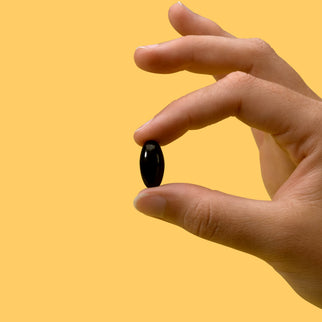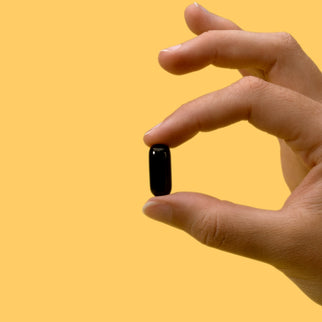Fish oil supplements have become synonymous with omega-3, but they are two separate things. Omega-3 fatty acids are a type of fat found in cells and tissues throughout organisms like fish, but they are not exclusive to fish.
Fish are the most popular source of omega-3s, as many people equate the two together, so you may be surprised to find out where else you can find omega-3.
Once you discover the complete differences between fish oil and omega-3s, you can determine the best way for you to include these fats in your diet.
What Is Omega-3?

Often discussed for its many potential health benefits, omega-3 is a type of polyunsaturated fatty acid needed for many functions in the human body. Omega-3 fatty acids play several important roles in the body, making up a building block of cell membranes, providing a source of energy for the body, and influencing how cells in the body interact with each other. With so many roles, omega-3s can influence several important systems in the body.
The three most common forms of omega-3 are:
- Alpha-linolenic acid (ALA), a short-chain omega-3 precursor
- Docosahexaenoic acid (DHA)
- Eicosapentaenoic acid (EPA)
All of these fatty acids are essential nutrients that we need to obtain through food to support our health. The easiest type of omega-3 to obtain is ALA, since it is found in many foods that we eat every day, like nuts, seeds, and vegetable oils. DHA and EPA, on the other hand, are much harder to obtain since they are only in a select few foods. Therefore, it is important to be mindful of how you are going to obtain these two omega-3 fatty acids.
What Are the Benefits of Omega-3 Fatty Acids?
Many people have added fish oil to their medicine cabinets because of its strong reputation as a source of omega-3s. The following are some of the health benefits of omega-3 fatty acids:
- Help to support healthy triglyceride levels
- Support heart health
- Help maintain a healthy blood pressure
- Support healthy joints
- Support overall emotional wellness
- Help maintain healthy eye function
- Support healthy cognitive function
What Is Fish Oil?

One of the most common forms of omega-3 fatty acids is fatty fish. Many fish provide valuable DHA and EPA omega-3s. Since DHA and EPA are hard to come by in a standard diet, many people point to fish as the easiest way to obtain them.
Experts generally recommend eating two servings of fish a week, but this is not realistic for everyone. Therefore, many people prefer to turn to fish oil for a quick and easy alternative. Fish oil is oil that is extracted from fish tissue, and it is usually extracted from oily fish like mackerel, sardines, anchovies, and salmon.
Fish oil can come in various forms, like cod liver oil, which also contains vitamin A and vitamin D. Fish oil may also be used in prescription medications. For example, ethyl esters, a mixture of fats found in fish oil, are used in medications to support cholesterol levels already within the healthy range.
Fish oil supplements have become commonplace in many homes as people look to reap the benefits of omega-3. However, the benefits of fish oil are not exclusive to fish oil. Although fish oil is rich in omega-3s, it is important to recognize that fish is not the only form of omega-3s.
Does Fish Oil Have any Side Effects?
Fish oil is generally considered safe but can cause some mild side effects. The most common side effects are more unpleasant than harmful, like nausea, indigestion, and stomach discomfort. Taking fish oil can also leave you with the inconvenient side effect of fishy breath.
Fish oil is also a natural anticoagulant, which means it may prevent your blood from clotting. Avoid taking fish oil with other coagulants or blood thinners, as it may increase your risk of bleeding.
Fish oil does pose some other risks due to the potential presence of marine contaminants. Because of the potential for mercury contamination, many women prefer to avoid fish during pregnancy and breastfeeding.
Since cod liver oil has a high presence of vitamin A, medical experts also recommend against taking this supplement during pregnancy. Be sure to consult your doctor for medical advice before you consider taking any omega-3 dietary supplements.
What Are Other Sources of Omega-3?
If you automatically associate the term “omega-3” with fish oil, you may be surprised to find that there is a whole world of options for obtaining essential fatty acids through your diet.
This is good news for anyone who wants to experience the benefits of omega-3 but does not want to resort to eating fish. Although fish oil is one of the most well-known options, there is a range of omega-3 fatty acid supplements you can turn to for the same benefits. In fact, some of the options for omega-3 supplements provide even more benefits than fish oil.
One common example is krill oil, a supplement made from small ocean crustaceans. Krill oil offers more antioxidants than fish oil due to the carotenoids found in these little creatures. However, krill oil does not provide much relief for many people as it comes with many of the same drawbacks as fish oil. Krill oil can have a fishy taste and is, of course, not friendly to people on a plant-based diet or with shellfish allergies.
There are several plant-based sources of omega-3 fatty acids, but they are not all the same. For example, flaxseed, chia seeds, flaxseed oil, soybean oil, and canola oil all contain omega-3, but they only contain ALA omega-3s and do not provide the potential benefits of EPA or DHA.
Where Does Omega-3 Actually Come From?
Although many people think of fish as the ultimate source of omega-3, the story goes a little bit deeper. In addition to the above sources of omega-3, there is another that we rarely hear of — a little green plant called algae. Algae is one of the richest forms of omega-3, and it is the only plant source of DHA and EPA omega-3s.
Not only is algae an abundant source of these two omega-3s, it may just be the source. Despite their popularity as a source of omega-3, fish do not produce omega-3s on their own. The reason that fish are so rich in DHA and EPA omega-3s is actually that they feed on microalgae and absorb the fatty acids through their own diet.
Do All Forms of Omega-3 Work the Same Way?
Although omega-3s are the same type of fats, they can interact with your body differently depending on their source. Which source you choose for your omega-3 intake may even provide you with additional benefits.
The most common area where sources of omega-3 differ is how they are absorbed by the body. Absorption rate refers to how well your body absorbs a nutrient into the bloodstream and is able to put it to use after consumption. With higher absorption rates, your body can put more omega-3 into the bloodstream faster.
Different sources of omega-3 offer different absorption rates. In one study, results showed that the omega-3s in certain types of algae were absorbed 1.7x better than those from fish or krill oil, meaning the body was able to put them to use faster for more potential benefits.
How you get your omega-3s may also impact how beneficial they are. Omega-3s are known for supporting cholesterol levels already within the normal range, but different studies have shown that the impacts vary depending on how you consume them.
In studies, fish oil has shown mixed results on cholesterol. The supplement has been shown to increase levels of beneficial high-density lipoprotein (HDL) cholesterol in the blood. However, fish oil also led to an increase in harmful low-density lipoprotein (LDL) cholesterol, showing questionable benefits.
Meanwhile, the effects of algae-sourced omega-3s are less ambiguous, with studies showing a potential for algae-based omega-3s to support overall cholesterol levels that are already within a healthy range.
If you are interested in including omega-3s in your diet, talk to your healthcare provider to see which source is the best option for you.
Choose a Reliable Fish-Free Source of Omega-3
The next time you hear someone mention only fish oil as a source of omega-3, be sure to correct them by letting them know where omega-3s really come from. While you’re at it, be sure to inform them that they, too, can get their essential omega-3s from algae.
At iwi life, we are firm believers in the power of algae to provide DHA and EPA for your overall health and wellness. Just one softgel provides a combined 250 mg of DHA and EPA to help you get your daily recommended intake. To see all of the potential benefits for yourself, explore the complete iwi life family of products.
Sources:





















